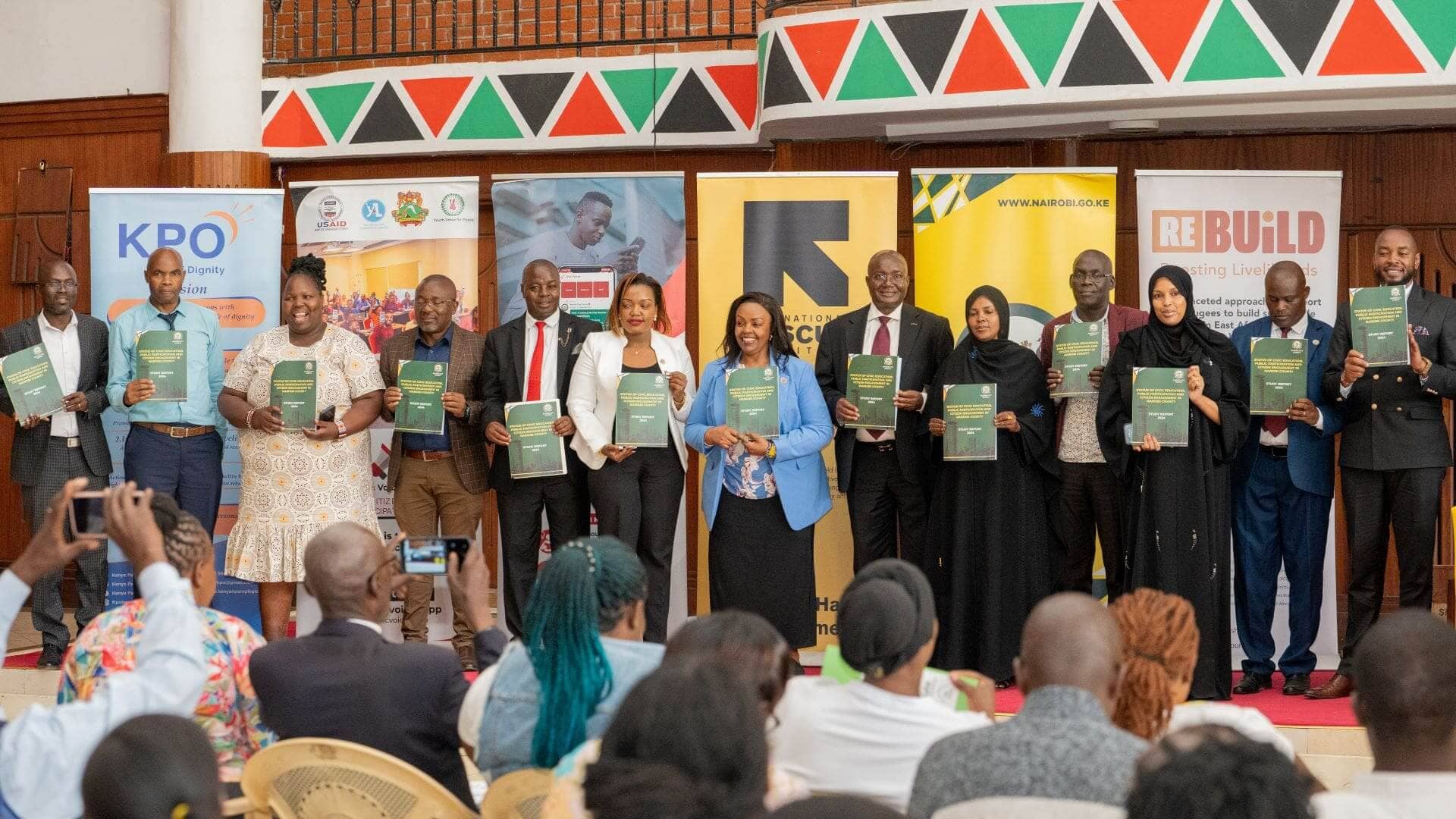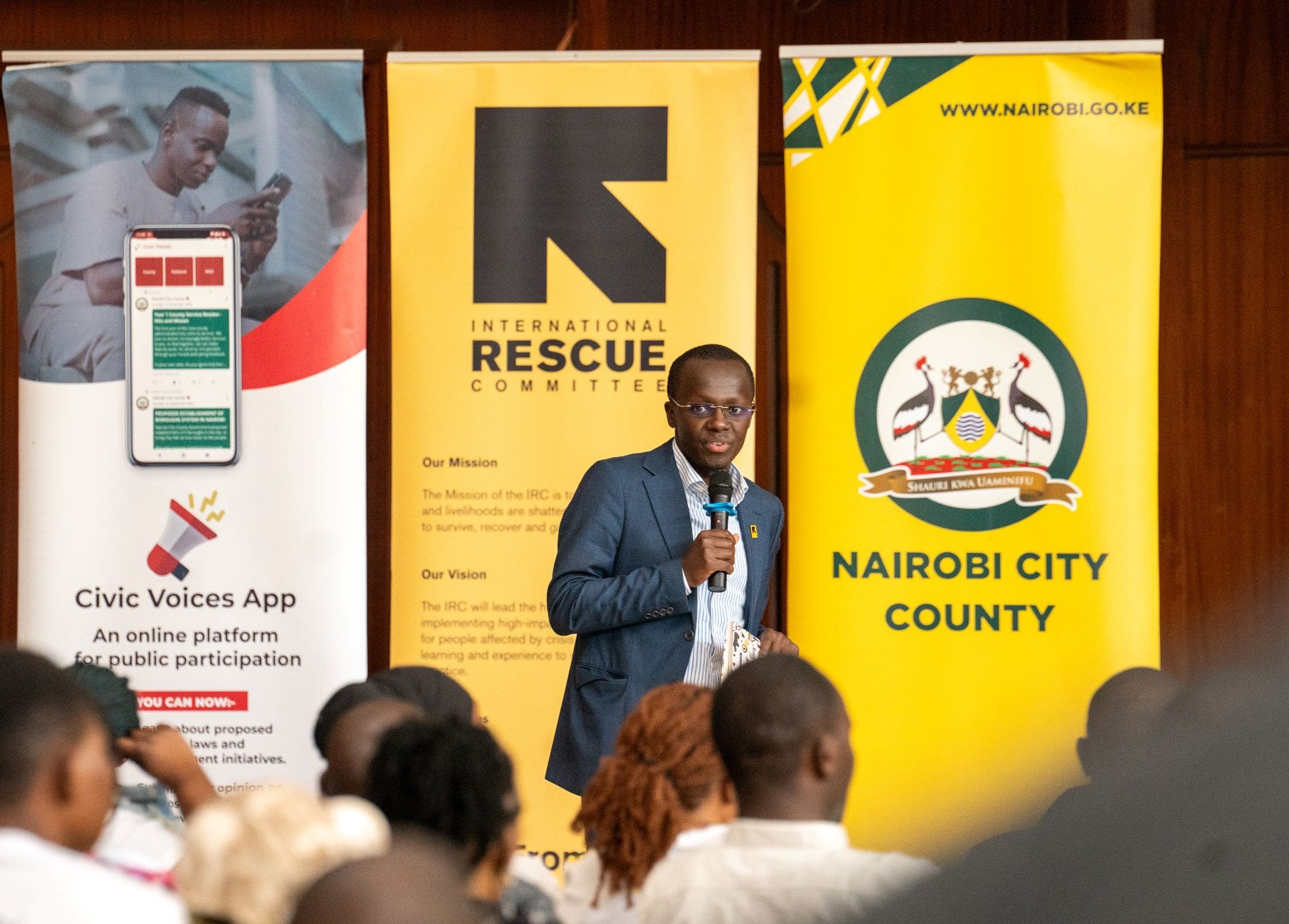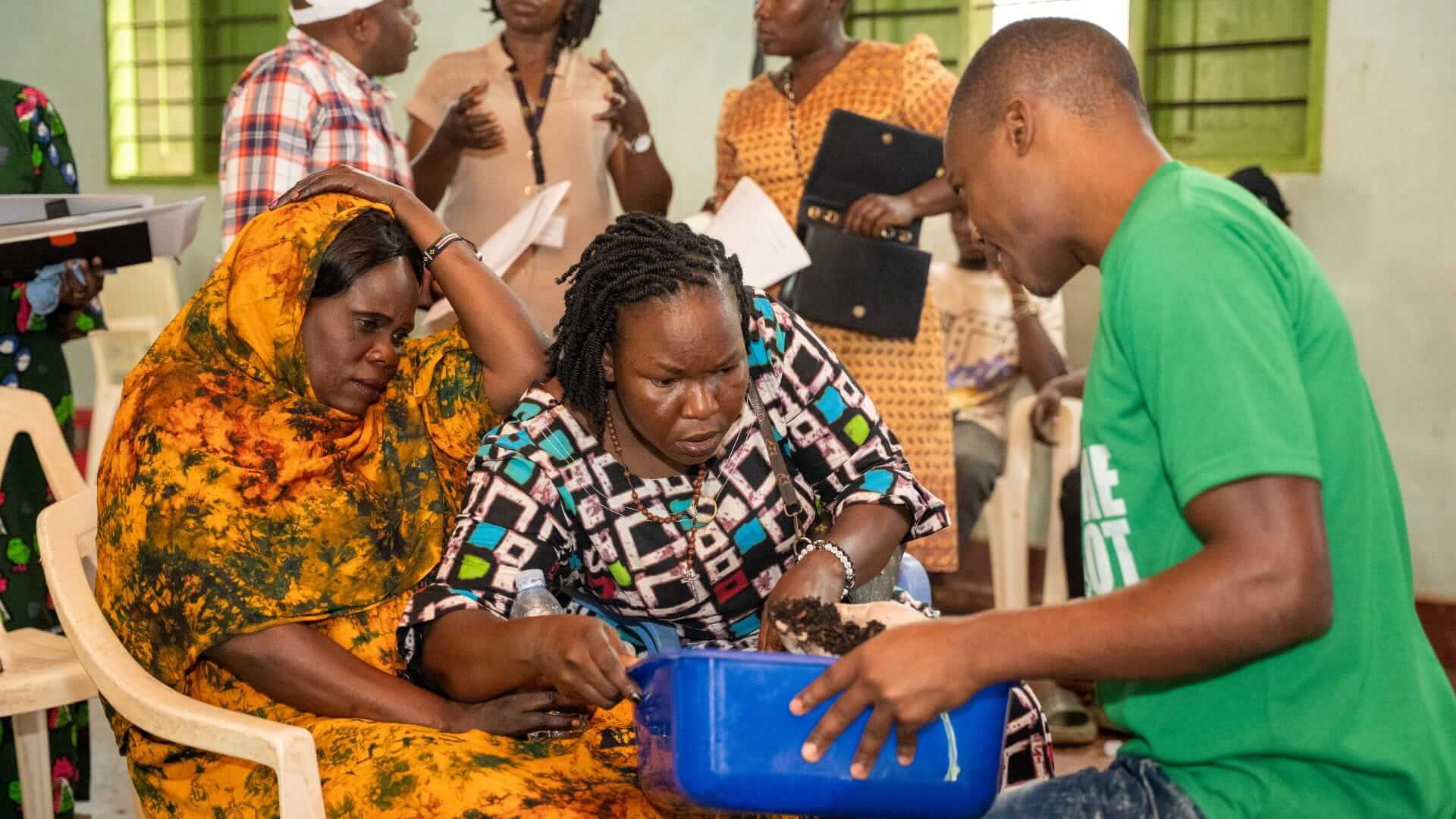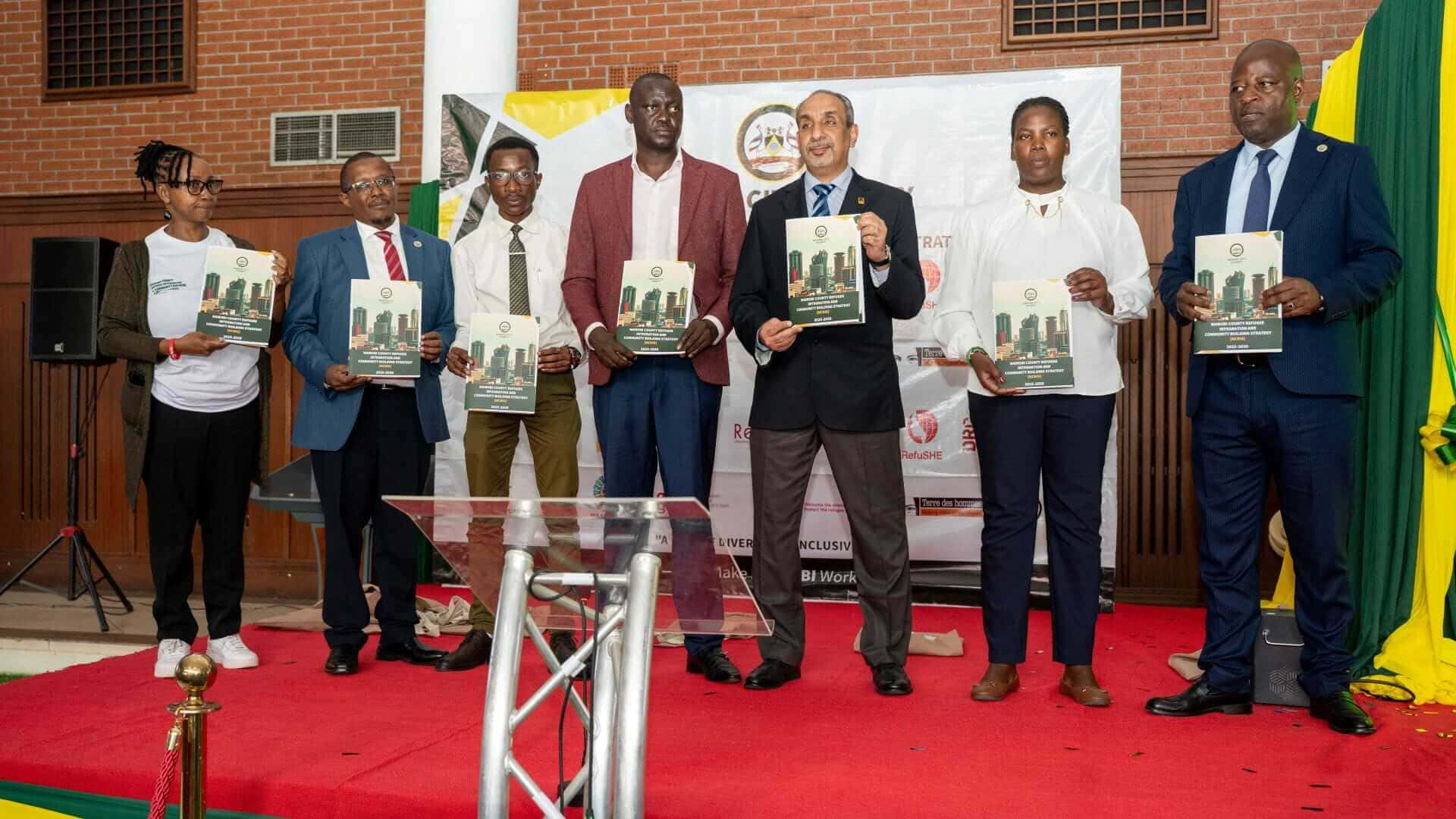Nairobi County Launches a Report to Strengthen Public Participation and Civic Engagement
Nairobi County Launches a Report to Strengthen Public Participation and Civic Engagement
Nairobi County Launches a Report to Strengthen Public Participation and Civic Engagement

Nairobi County Executive Committee Member for Inclusivity, Public Participation, and Customer Service, Ms. Rosemary Kariuki (Blue jacket), alongside County Chief Officer for Public Participation, Citizen Engagement, and Customer Service, Ms. Zipporah Mwangi (White jacket), and Directors of Public Participation from various counties during the launch of the Civic Education, Public Participation, and Citizen Engagement Status Report on February 26, 2025 (PHOTO: Edgar Otieno/TheIRC)
Counties play a crucial role in economic development, with the central government allocating 15% of the Kenya’s GDP to the county governments much as challenges persist, particularly in public participation. A report by KIPPRA and NGEC (2017) on the status of public participation highlighted that citizen participation in the counties has been very low. Special Interest Groups (SIG) such as the youth, women, people with disabilities (PWDs), older members of the society, minorities and marginalized groups are still underrepresented in public forums.
In response to this challenge, the Nairobi County Government (NCCG), on February 26, 2025, launched the Civic Education, Public Participation, and Citizen Engagement Status Report.
The report, developed in collaboration with non-state actors, is the result of extensive research conducted across various wards to capture diverse perspectives. It provides a comprehensive analysis of the effectiveness of public participation mechanisms within Nairobi City County, identifying gaps and challenges that hinder meaningful civic engagement. It highlights issues such as limited access to information, inadequate inclusion of marginalized groups, and low awareness among citizens about their rights and participation channels
Speaking at the launch event, Nairobi County Executive Committee Member for Inclusivity, Public Participation, and Customer Service, Ms. Rosemary Kariuki, delivered remarks on behalf of Governor Johnson Sakaja. She reflected on Nairobi’s governance journey since 2013, emphasizing a shift toward a more transparent and participatory administration, reiterating the essential role of public participation in holding the government accountable and emphasized his administration’s dedication to its mandate.
“We created a directorate of public participation to streamline and consolidate public participation and civic education in the county. If you want to know what your government is doing, you can get in touch directly with that directorate, and there find the information you need to begin to engage with us—and the help you need to understand it,” said Ms. Rosemary Kariuki.
The County now plans to decentralize public participation from the sub counties to the wards, making civic education more accessible and increasing engagement at the grassroots level.
Inclusion of Refugees and Children in Public Forums
The report highlights the importance of refugee inclusion in governance and public participation processes in Nairobi City County. It emphasizes that inclusive public participation promotes good governance, accountability, and equitable service delivery and so vital for Marginalized groups inclusion such as refugees, often face barriers to accessing civic education and participation mechanisms.
The document notes that the participation of refugees in civic processes remains low due to limited awareness, accessibility challenges, and a lack of targeted policies to ensure their representation. It recommends enhancing public participation by ensuring accessible information, engagement platforms, and collaboration with civil society organizations.
The inclusion of the voices from refugee communities and children, is a first-of-its-kind initiative in Kenya and a framework is currently being developed to ensure children’s participation in public forums is fully implemented.
The findings will inform policy and legal reforms, to enhance the NCCG Public Participation Act of 2016, as well as the refining of guidelines, standards, and regulations. By addressing these gaps, the report aims to enhance the inclusivity, accessibility, and effectiveness of civic education and public participation.
With this initiative, Nairobi County is setting a precedent for other counties in Kenya by ensuring every voice matters in governance. By prioritizing accessibility, inclusivity, and active participation, the county is strengthening devolution and empowering citizens to shape the future of their communities.
Several stakeholders who committed to this project include World Vision Kenya, Pamoja Trust, United Disabled Persons of Kenya (UDPK), International Rescue Committee, CARE Kenya, Geospatial Synthesis, URAIA Trust, County Governance Watch (CGW), Kenya Alliance of Resident Associations (KARA), Mzalendo Trust, Kenya Paraplegic Organization (KPO), Civic Voices, Ecumenical Center for Justice and Peace, Katiba Institute, Center for Economic Governance, Remusi Housing Cooperative and the Kenya Human Rights Commission.
Other key members who attended the launch are the Directors of Public Participation from Machakos, Siaya, Vihiga, Mandera and Nyandarua County, recognizing Nairobi’s significance as a benchmark for best practices in citizen engagement for other counties.

Jamin Kusuania, Senior Advocacy Manager at the International Rescue Committee’s - Re:BUiLD program, applauded the county for taking a bold step toward inclusion.
“We commend the County Government for its courage in auditing public participation and prioritizing marginalized communities, including PWDs and refugees. This is what true inclusion looks like—ensuring every citizen’s voice is heard. We look forward to collaborating with the county to turn these recommendations into action,” said Jamin.
Similarly, Pamoja Trust, the Re:BUiLD partner for community level advocacy for social cohesion between refugees and hosts, lauded the county’s efforts to include marginalized communities.
“NCCG has provided a platform for marginalized communities to participate in forums and engage in decision-making. We congratulate you and are committed to realizing the full potential of devolution,” said Evans Abondo the Program Officer at Pamoja Trust.
Victor Musirimu, a refugee and community champion, underscored the report’s significance in advocating for marginalized groups, highlighting its role in fostering inclusive governance and equitable representation. .
“May God bless Nairobi County for the great work being done. As community and budget champions, we appreciate the county’s commitment to supporting marginalized communities.”

